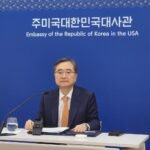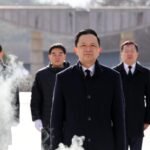 |
On November 21, 2024, Singapore’s Lianhe Zaobao published an article by Professor Kang Joon-young of Hankuk University of Foreign Studies titled “China Should Exert Its Influence on North Korea.” The piece expressed the hope that China would restrain North Korea from aiding Russia and prevent the formation of a military alliance between Pyongyang and Moscow. Professor Kang also noted that China holds absolute economic influence over North Korea and possesses sufficient power to shape Pyongyang’s policy. This is not only Kang’s personal view but also that of many observers in South Korea and other countries concerned about the situation on the Korean Peninsula. Such expectations are idealistic, and the assessment of China’s overwhelming power relative to North Korea is correct. Yet this does not mean that relying on China to prevent Pyongyang from supporting Russia is realistic. On the contrary, not only in the matter of North Korea’s assistance to Russia, but also in most of Pyongyang’s key policy decisions, Beijing lacks the will to intervene, and even limited persuasion often fails to alter North Korea’s course. Those familiar with the history of the Korean Peninsula and the political order of Northeast Asia are aware of the close “blood alliance” forged between China and North Korea after China’s entry into the Korean War in 1950 to fight against U.S. and South Korean forces, as well as of China’s overwhelming post-reform economic leverage over North Korea. Many therefore infer that China has decisive influence over Pyongyang’s major domestic and foreign policies (some even claim that North Korea is a Chinese puppet acting at Beijing’s direction), and that China is both capable of and willing to prevent North Korea—more precisely, the Kim family regime—from taking actions harmful to China’s interests or to peace and stability on the peninsula and beyond. Such views, however, stem from conventional logic in international relations rather than from the actual trajectory of Sino–North Korean relations or the genuine character of China’s foreign policy over the past decades. There is no doubt that China has exerted an extremely important influence on the creation and subsequent development of the Democratic People’s Republic of Korea. The Chinese Communist Party and the People’s Republic of China played decisive roles during the peninsula’s division and civil war from the late 1940s to the mid-1950s, and for many years thereafter contributed significantly to North Korea’s reconstruction and survival. In many periods, China even surpassed the Soviet Union as the principal external force behind the establishment and consolidation of the DPRK. Nevertheless, whether under Mao Zedong or under Deng Xiaoping and later Chinese leaders, Beijing never showed the will to actively interfere in North Korea’s domestic or foreign affairs. Even when Pyongyang made decisions clearly detrimental to Chinese interests, Beijing usually acquiesced. The most illustrative example is the August Faction Incident of 1956, when Kim Il-sung purged the “Yan’an faction” of the Workers’ Party—officials with close ties to the Chinese Communist Party—executing or imprisoning them and eliminating their influence in party, government, and military leadership. China did nothing to stop this: it neither supported the Yan’an faction’s attempt to unseat Kim nor punished Kim afterward, but instead accepted the political purge as a fait accompli. Later, during China’s Cultural Revolution, Pyongyang repeatedly criticized Beijing, yet China continued to supply aid, even helping build the Pyongyang Metro. After the launch of “reform and opening up,” China hoped North Korea would emulate its path. But despite three generations of the Kim family resisting such reforms, China never forced the issue. Beijing consistently accommodated Pyongyang and refrained from using its considerable economic and political leverage to push North Korea toward reform and opening. On the nuclear issue, China does not support North Korea’s nuclear armament, which brings Beijing more harm than benefit. Yet China has not taken firm or forceful measures to stop it, instead maintaining a passive stance—neither endorsing nor decisively opposing Pyongyang’s nuclear ambitions. Although China voted in favor of UN sanctions resolutions, enforcement was lax. This contrasts sharply with the United States’ success in preventing Taiwan from developing nuclear weapons and in suppressing similar ambitions in Japan and South Korea. In 2013, Kim Jong-un executed his uncle Jang Song-thaek, regarded as China’s most pro-Beijing and reform-minded ally within North Korea. Beijing did not intervene or retaliate. Likewise, Kim Jong-nam, Kim Jong-il’s eldest son—widely believed to have been China’s preferred successor—was assassinated in 2017, and China again took no responsive action. The same pattern holds in foreign affairs. Whether North Korea adopts a belligerent stance toward South Korea, Japan, and the United States, or makes gestures of reconciliation, Beijing has rarely reacted—neither publicly nor privately—with any substantial reward or punishment. China simply lets Pyongyang act as it pleases. From these precedents, it is clear that for decades China has maintained a policy of non-intervention toward North Korea—even when Pyongyang’s behavior runs counter to Beijing’s interests. Why has China taken this stance? The answer is complex. In short, since the founding of the PRC, Chinese rulers have strictly adhered to the principle of “non-interference in other countries’ internal affairs” and have long prioritized political stability—especially in neighboring or allied states. This attitude can be traced back to the ancient Chinese notion of the “Celestial Empire” (tianchao), which looked down on surrounding “barbarian states” yet refrained from meddling in their internal affairs, thereby displaying imperial magnanimity—a stark contrast with Western empires that frequently intervened in the domestic politics of colonies or smaller nations. After 1949, Mao Zedong and Zhou Enlai promoted the principles of “independent foreign policy,” “mutual non-interference,” and “seeking common ground while reserving differences” to win support from Third World countries, compete with the Soviet Union for leadership of the socialist bloc, and project China as a great power that treated small nations as equals. Beijing took the lead in practicing these ideas and gradually radicalized them. Toward allies like North Korea and Albania, China was even more indulgent and generous—providing lavish aid while avoiding interference that might displease their leaders. After the reform era began, these doctrines persisted but gained new motives. Especially from the 1990s onward, China’s system and leadership developed a deep aversion to “turmoil” and “political upheaval.” This preference for order and conservatism shaped both domestic and foreign policy. Internationally, it meant deliberate avoidance of involvement in other countries’ internal disputes (particularly on human rights issues) and deference to their sovereignty. When confronted with internal conflicts abroad, China has almost always sided with incumbent regimes rather than opposition forces, preferring to preserve the status quo. For example, during Iran’s 1979 Islamic Revolution, when even Washington abandoned the tottering Pahlavi monarchy, China continued to support the Shah—though he was neither friendly nor important to Beijing. Unsurprisingly, Ayatollah Khomeini’s new regime resented China, and Sino-Iranian relations remained cool for decades. Similarly, when Nepal’s Maoist Communist Party controlled much of the country in the mid-2000s, Beijing instead supported King Gyanendra, even accusing the Maoists of “stealing the great leader Mao’s name.” While China has indeed meddled in Western nations such as the U.S., Europe, Canada, and Australia—especially regarding Taiwan—it strictly observes non-interference toward friendly or neutral countries that avoid criticizing China’s domestic affairs or human-rights record. This reciprocal restraint helps safeguard the Communist regime’s own political stability. Beijing thus rewards countries that respect its “non-interference” demand. Compared with assessing the concrete gains or losses each country’s policies bring to China, Chinese leaders place greater importance on upholding this red line and the overarching principle that “stability overrides everything.” In diplomatic practice, this manifests as passivity—recognizing faits accomplis, avoiding involvement, and refusing to take strong corrective action. Under such a diplomatic philosophy, Professor Kang’s and others’ expectations that China will restrain North Korea from assisting Russia or forming a military alliance with it are bound to be disappointed. Xi Jinping’s remark that China “will not allow chaos on the Korean Peninsula,” as cited by Kang, does suggest displeasure with some of Pyongyang’s more radical foreign policies and a veiled unease about a loud North Korea–Russia partnership. But fundamentally it reflects Beijing’s obsession with stability and its implicit warning to the U.S., South Korea, and Japan—yet again affirming the doctrine that “stability overrides everything.” From China’s standpoint, confronting Pyongyang over its aid to Russia would damage Sino-North Korean friendship and regional stability—an outcome Beijing considers worse than the aid itself. China’s long tolerance toward North Korea also stems from their special “blood alliance” and shared history of fighting the United States—the world’s preeminent power. The Korean War was the PRC’s founding war of legitimacy and international prestige. Both governments maintain a strong anti-American stance, and North Korea, as one of the few staunchly anti-U.S. nations, serves as China’s “natural ally” against Washington and the West. For this reason, Beijing has long indulged Pyongyang’s many actions, especially those targeting the U.S., without interference. Furthermore, North Korea itself fiercely defends its autonomy and rejects foreign interference. Whether motivated by the Kim regime’s self-interest or by its ideology of “self-reliance” (juche) and opposition to “servitude to great powers,” Pyongyang deeply resents outside meddling—even from its closest patron. Unless China exerts overwhelming pressure and pays a heavy price, ordinary diplomatic coercion has little effect and may even provoke defiance. Specifically, regarding the North Korea–Russia alliance and possible North Korean involvement in Ukraine, Pyongyang is unlikely to relent. In recent years, North Korea has suffered worsening famine and natural disasters while facing an increasingly united U.S.–Japan–South Korea alliance. Desperate for aid, and with China unwilling to violate sanctions by providing military support, Pyongyang found a perfect partner in similarly isolated and sanctioned Russia. Moscow can supply desperately needed food and, in a crisis, potentially assist in “suppressing unrest” to preserve the Kim regime. For Kim Jong-un’s government, breaking ties with such an indispensable, like-minded ally is unthinkable. Thus, the combination of Pyongyang’s obstinacy, Beijing’s passivity, and the structural inevitability of a North Korea–Russia partnership makes it unrealistic to expect China to restrain or prevent such an alliance. However, this does not mean the international community should stop urging China to act or refrain from applying pressure. Even if it is difficult to make Beijing block the Pyongyang–Moscow axis, China—as well as all other states—has a moral duty to uphold international justice and safeguard world peace. Whether Russia’s invasion of Ukraine or North Korea’s nuclear weapons development and mutual support between the two, such behavior threatens global stability, violates international law, and undermines justice. As a self-proclaimed “responsible major power,” a permanent member of the UN Security Council, and a Northeast Asian state, China bears moral and legal responsibility to stop North Korea from aiding Russia’s aggression and Russia from supporting Pyongyang’s nuclear ambitions, and to respect and address the legitimate concerns of South Korea and other nations. The international community is justified in demanding that China assume greater responsibility for the Korean Peninsula, Ukraine, the Far East, and the world at large. Moreover, China’s overemphasis on stability and rigid adherence to the principle of “non-interference in other countries’ internal or external affairs” requires re-examination. Not only regarding North Korea but in dealing with all international issues, Beijing should not use the label of “internal affairs” as the sole criterion for action or inaction. Instead, it should consider the inherent right and wrong of each matter, the implications for China’s national interests, the impact on human rights in the concerned country, and the broader consequences for international justice and peace. Chinese diplomacy must move beyond outdated dogmas and become more flexible, responsive, and attuned to the complex realities of the modern international order. submitted by /u/Slow-Property5895 |
Stability and Non-Interventionism: The Tone and Roots of China’s Policy Toward North Korea
fail family history Japan Justice Korean War LG Military North Korea Peace Politics Punishment Pyongyang Ukraine Warning
Related Posts
Latest News from Korea
- Girl group Katseye makes Jimmy Fallon show debutKatseye, the girl group jointly launched by Korea’s Hybe and U.S. label Geffen Records, appeared on the popular NBC TV program “The Tonight Show Starring Jimmy Fallon” on Thursday (U.S. time). Fallon introduced the K-pop group as “TikTok’s Global Artist of the Year and a nominee for two Grammy awards” before welcoming the six members, who took the stage in… Read more: Girl group Katseye makes Jimmy Fallon show debut
- Where to find special chocolates for Valentine’s Day in SeoulValentine’s Day, which falls on Feb. 14, may come wrapped in roses, but chocolate is its most enduring language of affection for this occasion. From hand-painted bonbons and glossy jewel-like pralines to bean-to-bar creations that spotlight the journey of cacao itself, Seoul’s artisan chocolatiers are turning sweets into storytelling. Whether you’re after playful sets inspired by literature or gift boxes… Read more: Where to find special chocolates for Valentine’s Day in Seoul
- FM Cho says Korea is not deliberately delaying legislative process for trade dealForeign Minister Cho Hyun said Thursday he told U.S. Secretary of State Marco Rubio that Korea is not deliberately delaying a legislative process needed to implement its investment pledge under a bilateral trade deal. Cho made the remarks during a press meeting, pointing out that Rubio noted an unfavorable atmosphere in the United States regarding a lack of progress in… Read more: FM Cho says Korea is not deliberately delaying legislative process for trade deal
- Ex-figure skater K-pop star sparks airport frenzy in MilanThe arrival hall at Milan Malpensa Airport turned into a frenzy Thursday as K-pop star Sunghoon arrived ahead of the 2026 Milan Cortina Winter Olympics. The ENHYPEN member drew a crush of local fans who packed the terminal, shouting his name and scrambling for photos as he made his way through the crowd. Sunghoon, 23, touched down alongside the South… Read more: Ex-figure skater K-pop star sparks airport frenzy in Milan
- Chinese ambassador pays tribute to Gwangju uprising victims at nat’l cemeteryGWANGJU — Chinese Ambassador to South Korea Dai Bing visited a national cemetery in the southwestern city of Gwangju on Friday and paid tribute to honor the victims from a 1980 pro-democracy uprising. Dai laid chrysanthemums and burned incense during his visit to the May 18 National Cemetery, paying tribute to those who sacrificed their lives for democracy in South… Read more: Chinese ambassador pays tribute to Gwangju uprising victims at nat’l cemetery
Latest Entertainment from Korea
- LE’V Steps Into the Light: “Spotlight Soul” Captures the Artistry, Growth, and Glow of a New Era in the 2026 Season’s Greetings CollectionPhoto Credits: CHROMOSOME LE’V Illuminates 2026 with “Spotlight Soul” LE’V enters 2026 with a statement that feels both cinematic and deeply personal. His Season’s Greetings “Spotlight Soul” concept photos reveal a striking evolution — one that merges emotional depth with artistic clarity. The project, released as a collector’s visual experience, celebrates not just another year but LE’V’s firm grasp on identity, craft,… Read more: LE’V Steps Into the Light: “Spotlight Soul” Captures the Artistry, Growth, and Glow of a New Era in the 2026 Season’s Greetings Collection
- KiiiKiii Leesol & Haum Illuminate SPUR x Dior Addict’s January 2026 Issue with Daring Light, Sensual Motion, and New Beauty CodesPhoto Credits: SPUR Dior Starship Entertainment A New Year, A New Iconic Pairing SPUR Magazine opens 2026 with a collaboration that feels both intimate and electric. The January 2026 Issue Pictorial Preview showcases KiiiKiii Leesol and Haum in a visual dialogue infused with Dior Addict’s luminous rebellion. Titled “Light Moves: The Addict State of Mind”, the spread captures the interplay of motion, reflection, and self-definition—a signal… Read more: KiiiKiii Leesol & Haum Illuminate SPUR x Dior Addict’s January 2026 Issue with Daring Light, Sensual Motion, and New Beauty Codes
- Breaking Boundaries: ifeye × KITTO Taiwan Redefine Visual Storytelling in the January 2026 Pictorial — A Fusion of Innovation & IdentityPhoto Credits: Hi-Hat Entertainment The Convergence of Vision and Identity The January 2026 Pictorial from ifeye × KITTO Taiwan marks a defining moment in East Asian creative media. Framed as both a celebration and an evolution, the collaboration bridges art direction, fashion narrative, and technological fluidity to capture a new generation’s pulse. More than a photoshoot, this issue acts as a visual manifesto—an exploration of… Read more: Breaking Boundaries: ifeye × KITTO Taiwan Redefine Visual Storytelling in the January 2026 Pictorial — A Fusion of Innovation & Identity
- Xiaoting in Full Bloom: Kep1er’s Shining Star Redefines Power, Grace, and Global Glamour in Wonderland China’s January 2026 Cover StoryPhoto Credits: KLAP ENTERTAINMENT Kep1er’s Xiaoting Captures the Moment Kep1er’s Shen Xiaoting steps into 2026 as a muse of modern elegance, fronting the January 2026 Wonderland China cover with an aura that’s both futuristic and fiercely grounded. As one of the brightest stars of her generation, Xiaoting embodies the balance between aspiration and artistry that defines global pop’s next chapter. “Confidence is not just… Read more: Xiaoting in Full Bloom: Kep1er’s Shining Star Redefines Power, Grace, and Global Glamour in Wonderland China’s January 2026 Cover Story
- BTS’s V Radiates Timeless Charisma in GQ Korea x Cartier’s February 2026 Cover: A Monument to Modern Elegance and Emotional PrecisionPhoto Credits: GQ Korea – Cartier – BigHit Music. – BTS V x Cartier: The Sound of Stillness and Strength For GQ Korea’s February 2026 issue, the cover unfolds like a cinematic confession. BTS’s V (Kim Taehyung)—known for his magnetic duality of mystery and warmth—joins forces with Cartier, the house synonymous with precision, artistry, and legacy. Together, they create a visual symphony that celebrates… Read more: BTS’s V Radiates Timeless Charisma in GQ Korea x Cartier’s February 2026 Cover: A Monument to Modern Elegance and Emotional Precision
Learn People & History of Korea
- The Evolution of Busan: A Historical Journey Through South Korea’s Second Largest Metropolitan CityAncient Beginnings: The Founding of Busan Busan, known as the second largest metropolitan city in South Korea, has a rich history that dates back to ancient times. The earliest recorded existence of Busan can be traced to the Goryeo Dynasty, where it was referenced as a vital coastal settlement. Its strategic location along the southeastern coast of the Korean Peninsula… Read more: The Evolution of Busan: A Historical Journey Through South Korea’s Second Largest Metropolitan City
- The Evolution of Pyongyang: A Journey Through History, Economy, and Political DynamicsIntroduction to Pyongyang Pyongyang, the capital city of North Korea, serves as a prominent symbol of the nation’s history and culture. Geographically located on the banks of the Taedong River, in the southwest part of the country, Pyongyang is situated within a strategic area that has historically facilitated trade and cultural exchange. The city’s origins can be traced back to… Read more: The Evolution of Pyongyang: A Journey Through History, Economy, and Political Dynamics
- The Evolution of Seoul: From Ancient Korea to Modern Metropolis and BeyondAncient Beginnings: The Founding of Seoul The city of Seoul, known today as the vibrant capital of South Korea, has ancient roots that trace back to the Three Kingdoms period of Korea, specifically the kingdoms of Baekje and Silla. Evidence suggests that Seoul was originally established as a settlement given its strategic geographical advantages. Nestled within the Han River basin,… Read more: The Evolution of Seoul: From Ancient Korea to Modern Metropolis and Beyond
- Exploring Korean Traditional Games in Squid Game: From Season 2 to Upcoming Season 3Introduction to Korean Traditional Games Korean traditional games have long been an integral part of the country’s cultural landscape, offering more than mere entertainment. These games, which range from simple children’s pastimes to complex community activities, hold significant cultural significance and often serve as a means of preserving history and promoting social interaction. Rooted in centuries of tradition, these games… Read more: Exploring Korean Traditional Games in Squid Game: From Season 2 to Upcoming Season 3
- Unveiling the Past and Present of Saju: The Art of Korean Fortune TellingIntroduction to Saju Saju, a traditional Korean fortune-telling practice, is an intricate art that seeks to interpret an individual’s fate based on their birth date and time. The term “Saju” translates to “four pillars” in English, referring to the four critical components derived from these time markers: year, month, day, and hour. This method holds significant cultural value within South… Read more: Unveiling the Past and Present of Saju: The Art of Korean Fortune Telling















